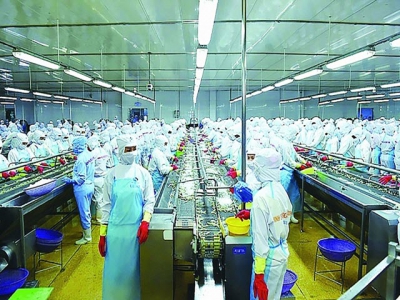Seafood industry must recover before September 15 to achieve its export target

Seafood exports have been strongly impacted by the pandemic. With the characteristics of the chain production industry, seafood businesses believed they must recover before September 15 to achieve their export targets.
Processing shrimp for export at Minh Phu Seafood Corporation. Photo: Q.Hieu
Exports in August were strongly affected
After more than a month of operation in the Directive 16 conditions, seafood firms in HCM City and 18 southern provinces have faced many difficulties and inadequacies, greatly affecting their production and export.
Most provinces and cities have required businesses to maintain operations only when ensuring the “three on-site” or “one routine – two locations” to stop the pandemic from spreading into factories and industrial zones. In fact, only about 30% of seafood firms in the southern provinces can ensure these conditions, with capacity slashed by more than half.
Production has declined in the past month and many export orders have been delayed or extended, which will lead to a sharp decrease in export turnover in August compared to the previous months and the same period last year.
According to VASEP, the pangasius industry suffered the most losses as more than half of the pangasius factories have been shut down recently. Shrimp and tuna exports may fall to less than that of pangasius. Seafood processing and exporting firms are concentrated in HCM City and the eastern provinces, so they will certainly decrease sharply compared to last month and to August 2020.
From the second half of July, social distancing directives caused the production of raw materials and seafood processing to slow significantly. As raw materials and stockpiled inventories from before can be used to export orders in July, the statistical results have not yet reflected the declining trend. However, compared to prior months, growth was notably lower.
According to Customs statistics, by the end of July, the country's seafood exports reached nearly US$5 billion, up 13% from the same period last year. Particularly in July, seafood export turnover still increased by 7.5%, hitting nearly US$854 million. Of which, exports to the US and EU markets increased sharply, to CPTPP countries and South Korea increased slightly, and to China decreased by 20%.
After the first seven months of the year, exports to the US saw the highest growth rate of 36%, to the EU increased by 19%, to CPTPP countries increased by 10%, while exports to China fell by more than 10%.
However, the growth rate of many export items has fallen since the beginning of July. After increasing by 28% in June, pangasius exports in July increased slightly by 2%, reaching US$226 million. Its seven-month accumulation hit US$907 million, up 15% over the same period last year, also reflecting the downward trend of growth in July.
In July, squid and octopus exports to Japan, Thailand, and China fell by 13%, 24%, and 25% respectively over the same period. Meanwhile, exports to the largest market, South Korea, increased slightly by 1.5%, and exports to the EU went up by 64%.
Must restore before September 15
Truong Dinh Hoe, General Secretary of VASEP, said if the seafood industry did not recover by September, there would be many consequences of chain breakage, with no or very little chance for recovery. If aquaculture production was not restored in time, raw materials such as shrimp and fish would be stagnant, making it extremely difficult for farmers.
Therefore, VASEP proposed production and business activities should be restored as soon as possible and no later than September 15.
To restore production and export, in addition to proposing to cut electricity bills by 30% for aquaculture and processing firms in the last six months; fishery firms suggested Vietnam Social Insurance should pay salaries to employees who are paying social insurance when they have to go into isolation or stop production in accordance with anti-pandemic regulations during the implementation of Directive 16 because businesses have had to endure many difficulties, including great pressure on costs when they stop or shrink production. Firms said the balance of insurance funds was very large. According to the Government's report, by the end of 2020, the total balance of social insurance and unemployment insurance funds was estimated at some VND935.1 trillion.
With such a large fund, social insurance is fully capable and must contribute resources to pay wages to employees when businesses are struggling and exhausted from resources due to the Covid-19 pandemic.
Currently, many seafood firms are trying to maintain production to retain workers, fulfill a part of export orders, so they wish to receive support soon to restore their production and export.
Related news
 Production linkage to bring seafood to the world market
Production linkage to bring seafood to the world market Mekong Company to link production with units providing 1,500 tons of seafood per month for processing and exporting to markets around the world.
 Tra fish export to China decreased due to import restriction policies
Tra fish export to China decreased due to import restriction policies Tra fish exports to China have decreased in the past 7 months and are at risk of further decline in the third quarter due to the country's import restriction
 Seafood exports plummeted in the first half of August
Seafood exports plummeted in the first half of August Seafood exports saw good growth in the first 7 months but plummeted in the first half of August due to Covid-19 in southern provinces and cities.